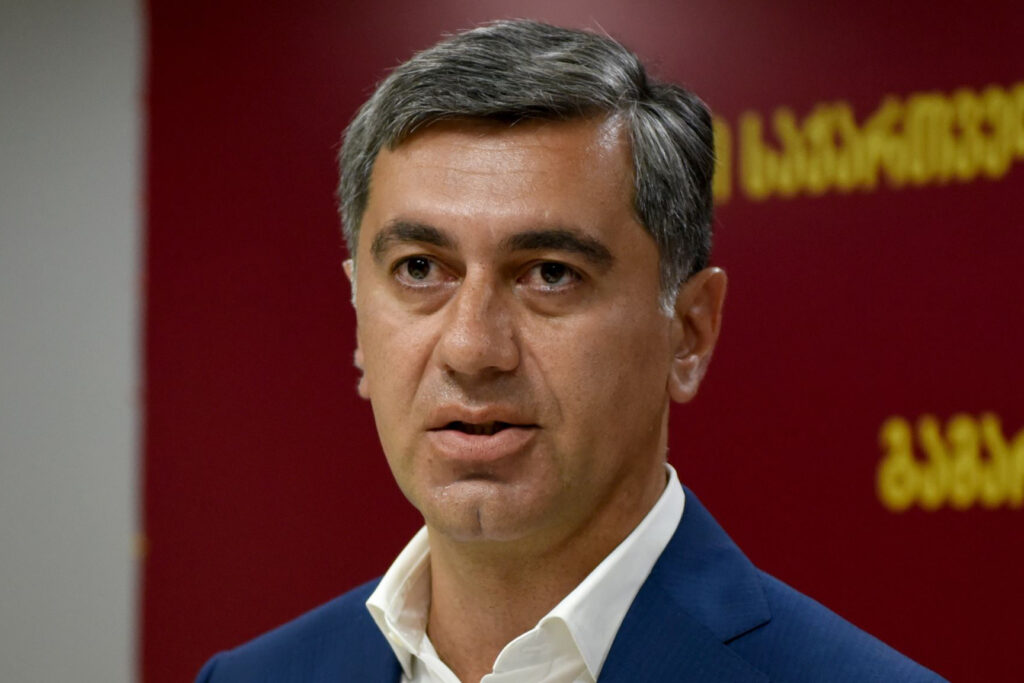Former Defence Minister of Georgia Irakli Okruashvili has been sentenced to five years in prison for ‘participating in group violence’ at an anti-government rally last June. Several opposition groups have claimed the verdict against him and others endanger a deal with the ruling Georgian Dream party to reform the electoral system together.
On 20–21 June last year, protesters clashed with riot police throughout the night in Tbilisi as they attempted to occupy the parliament building. The ensuing violence left 217 people hospitalised, including 80 police officers.
The protest was sparked by Russian MP Sergey Gavrilov’s address from the seat of the speaker of the Georgian Parliament, something critics said was offensive given Russia’s role in the conflicts in Abkhazia and South Ossetia.

On Monday, Tbilisi City Court acquitted Okruashvili of leading the violence but found him guilty of participating in it.
Several opposition groups have labelled him and others arrested following the clashes political prisoners.
European Georgia, the United National Movement, the Labour Party, and other opposition groups who have tentatively united since last summer to push for electoral reforms, condemned the verdict.
They said that by persuing said Okruashvili’s prosecution, the ruling Georgian Dream Party had broken their promise.
Georgian Dream promises: one broken, another contested
In June 2019, Georgian Dream responded to anti-government demonstrations by agreeing to one of their demands — to hold the October 2020 parliamentary elections under a fully-proportional system.
In November, the street protests that had been continuing on a smaller scale were reignited with a new force after the party voted down their own electoral reforms bill.

It took opposition groups and Georgian Dream almost four months of political deadlock and six rounds of negotiations brokered by Western diplomats to reach a deal on 8 March.
According to the March deal, Georgian Dream agreed to slash the number of single-member majoritarian constituencies from 43 to 30 in Georgia’s 150-member parliament.
This would mean increasing the number of MPs elected proportionally.
Two weeks after the deal was signed, Georgian Dream effectively suspended normal political life by declaring a state of emergency over the COVID-19 pandemic.
However, the party repeatedly vowed to respect the deal despite the circumstances.
What is now in dispute is what the opposition said was a verbal promise as part of the deal to end politically motivated prosecutions and ‘free political prisoners’.
Opposition MPs and non-parliamentary groups referred to a passage in an 8 March joint statement saying that all parties agreed ‘on the necessity of addressing actions that could be perceived as inappropriate politicisation of Georgia’s judicial and electoral processes and of avoiding any such actions in the future’.
European Georgia MP Elene Khoshtaria contemned the court ruling on Monday, tweeting: ‘Opposition leader Irakli Okruashvili sentenced to 5 years on Gavrilov night charges, despite political agreement to release him and two other political prisoners.’
Polit prosecutions continue in Georgia. Opposition leader Irakli Okruashvili sentenced to 5 years on Gavrilov night charges, despite political agreement to release him and two other political prisoners. Covid19 is no excuse for disruption of democracy! @achkhikvadze
— Helen Khoshtaria (@Helenkhosh) April 13, 2020
Others dubbed ‘political prisoners’ by opposition groups include European Georgia MP and former Tbilisi Mayor Gigi Ugulava, who was sentenced to 3 years in prison for embezzlement in February.
Another is Giorgi Rurua, a supporter of the anti-government protests who has been charged with illegal arms possession.
On 23 March, Besik Tamliani, a participant of 20 June’s anti-government protest, was released on bail — the last of 16 non-politicians arrested over the violence to be released from pre-trial detention.
Who is Irakli Okruashvili
After the 2003 Rose Revolution, Irakli Okruashvili occupied several top government positions until falling out with his former ally, then-President Mikheil Saakashvili, in late 2006.
In 2016, four years after Georgian Dream ousted Saakashvili’s United National Movement party from power and Okruashvili returned from his political asylum in France, the former government minister began to express increasing frustration with the new government.
After his unsuccessful bid to claim ownership of TV company Rustavi 2, Okruashvili formed his own political party, Victorious Georgia, on 11 June 2019, nine days before the anti-government rally in Tbilisi that turned violent.
He was arrested and charged for group violence a month after participating in 20 June street protest.
On 19 November, the state prosecution also charged Okruashvili with abuse of power for allegedly covering-up the 2004 killing by police of Buta Robakidze during his stint as Interior Minister.
[Read more on the Robakidze case: Five Georgian officials convicted over Robakidze killing cover-up]




 13 April 2020
13 April 2020



